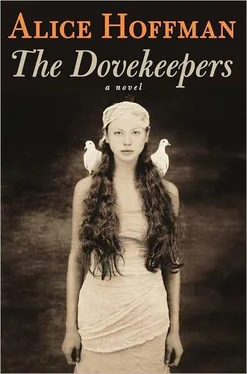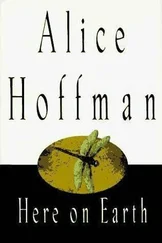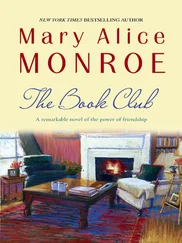Alice Hoffman - The Dovekeepers
Здесь есть возможность читать онлайн «Alice Hoffman - The Dovekeepers» весь текст электронной книги совершенно бесплатно (целиком полную версию без сокращений). В некоторых случаях можно слушать аудио, скачать через торрент в формате fb2 и присутствует краткое содержание. Год выпуска: 2011, ISBN: 2011, Жанр: Историческая проза, на английском языке. Описание произведения, (предисловие) а так же отзывы посетителей доступны на портале библиотеки ЛибКат.
- Название:The Dovekeepers
- Автор:
- Жанр:
- Год:2011
- ISBN:978-1-4516-1749-8
- Рейтинг книги:2.5 / 5. Голосов: 2
-
Избранное:Добавить в избранное
- Отзывы:
-
Ваша оценка:
- 60
- 1
- 2
- 3
- 4
- 5
The Dovekeepers: краткое содержание, описание и аннотация
Предлагаем к чтению аннотацию, описание, краткое содержание или предисловие (зависит от того, что написал сам автор книги «The Dovekeepers»). Если вы не нашли необходимую информацию о книге — напишите в комментариях, мы постараемся отыскать её.
The Dovekeepers — читать онлайн бесплатно полную книгу (весь текст) целиком
Ниже представлен текст книги, разбитый по страницам. Система сохранения места последней прочитанной страницы, позволяет с удобством читать онлайн бесплатно книгу «The Dovekeepers», без необходимости каждый раз заново искать на чём Вы остановились. Поставьте закладку, и сможете в любой момент перейти на страницу, на которой закончили чтение.
Интервал:
Закладка:
The Romans had already begun to lay down planks so they might walk across our wall in the morning. It was the night before our forefathers’ escape from Egypt, the night when our death began. There were husbands and wives lying down side by side on the blood-soaked cobblestones so that they might find their death together; children lined up, wailing. The ten executioners were at their sorrowful work, going from house to house, as the Almighty had done on the night of Passover, when Jews painted their doors with bloodstained hyssop flowers allowing Adonai to know them as true believers and pass them by so they might live.
I went through the Western Plaza, then down the steps toward the Northern Palace. My chest was aching, and drops of blood fell from me, but I went on. Above the chaos, I heard my daughter’s dog barking. I ran, following the echo of that desperate beast, avoiding all men, staying to the shadows until I saw figures near the entrance to a small pool where the king had once bathed in cool water surrounded by white lotus lilies he had brought from Alexandria. There, on the stairs, Amram had come up behind my daughter. Her arrows had fallen around her as he grabbed her at her waist and slit her throat. In doing so he had her for himself at last, but while she gasped in his arms, he had seen the silver medallion at her throat. When I spied him he had clasped her to him, his grief enormous, for he knew her for who she was for the first time, the warrior who had fought beside him and saved him. He cried out for what he had done, mourning all that had died with her.
Adir came rushing at Amram as I watched. My son hadn’t a spear or a sword, only his crutch, which he used to beat Amram, for he had seen his sister murdered and was standing in her blood. Amram turned and pierced him through, then finished his work with one swift cut at my boy’s throat. He wore his prayer shawl, as all the death-givers did, the garment which was always to be made of linen with a single blue woolen thread to remind its wearer of heaven and of God’s commandments. But Amram’s prayer shawl was stained, and appeared brown as the blood upon it clung to the linen.
I watched in a dream, as if I had seen this all before and had come here as a witness so that my children would not be alone in the hour of their death. I prayed to God that they would be embraced in the Shechinah, the dwelling place of the Lord.
My son was no warrior, only a boy. My warrior was a woman who would not have expected an attack from someone who had loved her so well.
The dog was wild over the injury to his mistress, wailing as though he were a man rather than a beast. He would not stand down when Amram turned to shout at him; he straddled Aziza’s fallen body, protecting her still form, his jaws snapping, flecked with foam. Amram kicked at him, then charged, but the dog stood his ground. He was a beast who craved revenge, more loyal than the warrior who now stabbed him through, time and again.
The mastiff refused to die, the guardian of my daughter, who in her death revealed herself to be only a young woman who had shorn her hair and worn men’s garb. Her red feathered arrows fallen around her, her field of flowers, her last farewell. Though mortally wounded, the dog grabbed on to Amram and refused to let go, his teeth sinking into his enemy’s flesh. I watched the struggle in a haze of grief, until both dog and man were so wounded neither could go on, yet neither one would die.
The Man from the Valley should have been at his leader’s bidding, for he was one of the chosen ten. Instead, he had come for Aziza. When he saw what had happened, he slit the dog’s throat so that the beast could die with honor, thereby releasing him from pain and from his duties in this world. But the warrior stood over Amram and watched him in his throes, offering no solace and no assistance. The man who had been Revka’s son-in-law when his name was Yoav, when he still had compassion and faith, let my daughter’s murderer die in anguish.
When Amram was no more, the Man from the Valley cut off the dead man’s armor to further dishonor him, so that the ground was littered with silver scales, and it could be known to God that here lay a coward unworthy of being called a warrior. Then the Man from the Valley took off his prayer shawl and covered Aziza, as though she were a man, a warrior who had fallen in battle. Perhaps that was what he wanted to believe. He could not bear to see her as a woman he had loved, a girl made of flesh, not iron, who had loved him in return.
When that maddened warrior had slipped back into the turmoil of the plaza, I hurried to my children. I closed their eyes and prayed for their spirits. I washed their feet and hands with water from the pool, though ashes had turned the water black. I wound the spells I had carried with me through the strands of their hair, so that they might be protected, if not in this world then in the World-to-Come. I thought of the moments of their births: Aziza’s in a chamber in Jerusalem where the women who worked at keshaphim urged me on to bring forth her life. Adir’s in a tent on the Iron Mountain, where I waited for my husband to ride his horse from the eastern reaches of Moab so he might be there on the tenth day to see his son and to name him a king of his people.
THE TEN went on their murderous rampage for our honor and for the Glory of God, and in this they had succeeded. As I made my way up the stairs to the plateau atop the mountain, there were bodies everywhere, those who loved each other, those who despised each other, those who had believed there would be freedom in Zion, those who had followed a husband or a brother, those who had been born on this mountain, those who had dreamed they would die here, all in a jumble upon the stones. I saw the raven in a black shawl who had cast me into the wilderness curled up in her garden, and I wept for her spirit. I saw Yael’s father, the assassin who had killed so many in the courtyards of the Temple in Jerusalem, splayed out near the barracks, his blood as bright as any flower.
I went to the dovecotes and opened the doors of the first two, at last coming to the stone columbarium that was shaped like a tower, the place where my daughters had most often worked beside me, where Revka had come in her mourning, where Yael had called the birds to her without a single word, as I knew she would when we’d gone to the marketplace in Jerusalem and she’d begged for a dove’s freedom and in return had given her promise to do whatever I asked.
I chased the doves out, shaking my shawl, whistling, as the hawk does, forcing them from their roosts. They lifted into the blackened sky all at once, flecking the darkness with their radiance, delivering the message that there was a time to die and a time to rise up.
THE MAN I loved met me at the door to my chamber. No one else was there, only the two of us, as there had been on the day he took me into his bed, when I left a scrim of vermilion on the bedclothes, not henna but blood. The others had fled. Yael had kept her promise. She’d done as I’d asked.
I let go of everything but my beloved. I did not care if there was blood upon him. I didn’t want to know how many he had slain, or if he had embraced his wife before he made quick of her or even if he’d asked for her forgiveness after all this time.
“Death walks beside us, but not with us,” he said to me as he took me into his embrace.
I was glad he hadn’t seen his new daughter. Had he done so, it would have been too painful for him to leave her, and I never wanted to be the cause of his pain, as I knew he never wished to cause me any grief. My mother had warned me what love would do to me. I hadn’t cared then, and I didn’t care now.
His eyes were gray, like the dove, like the mist that cleared when the world was first begun on the day God gave us the word and we could speak and our words turned the world into what it has come to be. I could have howled at fate and covered my head. I could have begged for more time, pleaded with him to flee with me. But perhaps I had been granted all that I had needed in this lifetime. My beloved was a stubborn man, a true believer. He was more complicated than any man I had ever known and the only one who could have called me to cross the Salt Sea and leave behind my husband and the green hills of Moab.
Читать дальшеИнтервал:
Закладка:
Похожие книги на «The Dovekeepers»
Представляем Вашему вниманию похожие книги на «The Dovekeepers» списком для выбора. Мы отобрали схожую по названию и смыслу литературу в надежде предоставить читателям больше вариантов отыскать новые, интересные, ещё непрочитанные произведения.
Обсуждение, отзывы о книге «The Dovekeepers» и просто собственные мнения читателей. Оставьте ваши комментарии, напишите, что Вы думаете о произведении, его смысле или главных героях. Укажите что конкретно понравилось, а что нет, и почему Вы так считаете.












